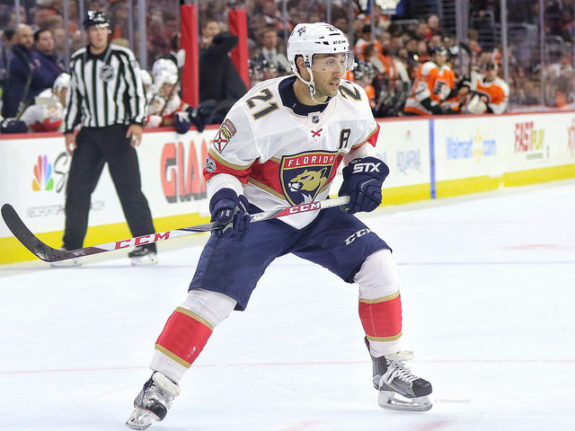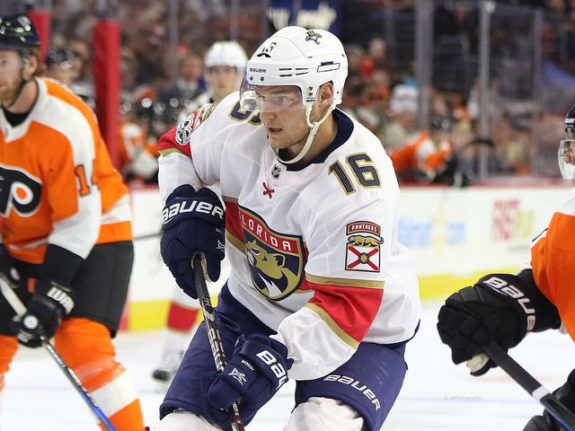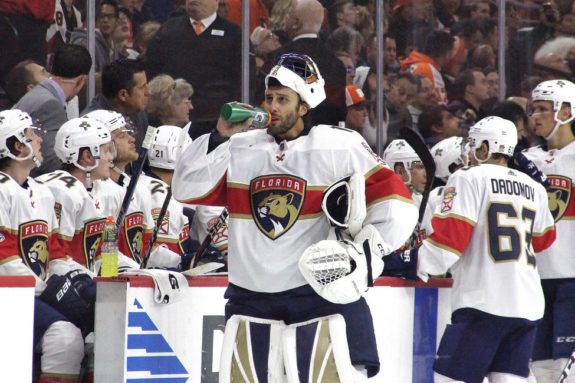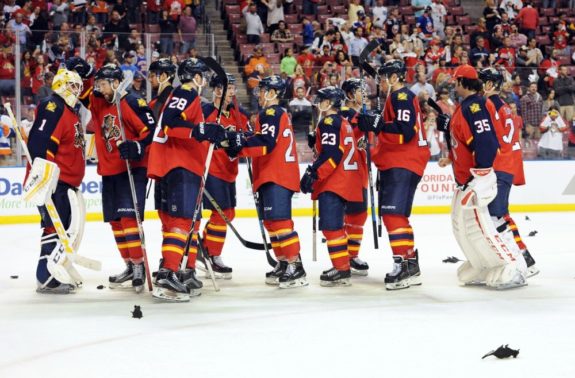Not much was expected of the Florida Panthers entering the 2017-18 National Hockey League season.
After all, they were coming off an embarrassing 2016-17 campaign, had gotten rid of two of their best scorers at the expansion draft and disposed of a top-four defenseman for some seriously suspect reasons.
Up until Jan. 29, the Cats appeared to be bumbling along according to these expectations, posting a record of 19-22-6, not quite bad enough to be serious contenders in the draft lottery, but nowhere near the playoffs, either. In other words, the worst possible place to be.
However, beginning with a 4-1 victory over the New York Islanders on Jan. 30, the Panthers are 13-3 in their last 16 games, their victory Sunday against the Philadelphia Flyers briefly vaulting them over the Carolina Hurricanes and Columbus Blue Jackets into the second wild card spot in the Eastern Conference. While the Jackets would retake the spot with a win Sunday evening, the Panthers have three games in hand on Columbus – and their three other closest competitors.
So, what’s changed? Are the Panthers really this good? More importantly, do they have a realistic shot at the playoffs?
What’s Changed for the Panthers?
What’s behind the suddenly piping-hot Panthers? As far as I can tell, their recent run of success is down to their goaltending and special teams.
Panthers’ Power-Play Prowess
Up until Jan. 29, Florida’s conversion rate with the man advantage was 16 percent, a dismal 27th in the NHL. However, since Jan. 30, it’s nearly doubled, with the Cats converting on 28% of their power play opportunities, third in the league over that time span.

Another big reason for Florida’s recent power play success is their shooting percentage with the extra man. During their first 47 games, the Panthers scored on just 8.5% of their shots on the power play. Considering the league average of 12.7%, that’s a pretty poor showing.
That said, during the 15 games leading up to their Sunday matinée with the Flyers, the Cats were scoring on a much healthier 18.2% of their power-play shots. Maybe that’s not sustainable, but if the pucks keep going in at this rate, notions of sustainability will become academic.
It’s worth noting the Panthers’ marginally below-average shooting percentage at even strength through their first 47 games (7.5%) has also gone up, sitting at 9.2% since Jan. 30 against a league average of about 8.1%.
Panthers Taking Fewer Penalties
While we’re on the topic of special teams, it’s not as though the Cats have been going to the power play much more often, either; they average 3.4 opportunities per game, in comparison to 3.1 during the first part of the season.

However, they have been taking far fewer penalties themselves, at just 2.4 per game, against 3.2 earlier in the campaign. While their penalty killing has not been any better of late, a decrease in penalties taken is a very easy way to cut down on goals against, and possibly even boost top players’ performance in other situations, as they have to expend less of their energy killing penalties.
Panthers’ Goaltenders Stepping Up
Finally, the goaltenders. Goaltending was the one thing not expected to be much of an issue for the Panthers this season and, by and large, it hasn’t been.
However, given the Panthers’ holes on defense and the adjustment to a new system of play under first-year head coach Bob Boughner, the Cats needed great goaltending to compete early in the season. While Roberto Luongo was fantastic early on, he went down with an injury on Dec. 4, not starting again until Feb. 17. While James Reimer and Harri Sateri were fine in the interim, “fine” was not what the Panthers needed to win; the Cats went 9-9-2 between Luongo’s injury and the start of this remarkable run on Jan. 30.
Again, not that the Panthers’ goaltenders were particularly bad during the first half of the season, but all three have made some extra saves during this tremendous push that has vaulted the Panthers into postseason contention.
Case in point: in the 47 games prior to Jan. 30, Florida’s goaltenders combined for a .914 save percentage. During the current run? A very healthy .923 SV%.

Are the Panthers Really This Good?
The short answer is, probably not.
Panthers’ Luck Balancing Out
Florida’s PDO (save percentage plus shooting percentage) was below the break-even mark through the first 47 games at 98.8, suggesting their on-ice performance was somewhat worse than should be expected of this team.
However, since then, it’s 101.5, suggesting that, no, the Panthers also can’t reasonably be expected to win over 80% of their games forevermore, as they’ve done since Jan. 30.
Thus, Panthers are not the bottom-feeders the first half of the season would have us believe, nor are they a sure thing to make the playoffs. The reality is somewhere in the middle; in an ideal world (statistics-wise), the Panthers are probably on the playoff bubble, scratching and clawing with other mediocre teams for a postseason position.
Don’t be fooled by their run of recent success; the Cats’ underlying numbers suggest they aren’t an especially good hockey team.
Panthers’ On-Ice Performance Positively Pedestrian
Through their first 47 games, the Panthers averaged 39.2 unblocked shot attempts per game at five-on-five, while giving up 40.1. That’s a 49.5 Fenwick For percentage, decidedly mediocre. Their Expected Goals For mark, just 48.5%, was even less impressive, though not unexpected considering the team was only generating 48.6% of the scoring chances.
But how about during their recent streak; surely, their recent success has to do with playing better, right?
Well, heading into Sunday afternoon’s tilt with the Flyers, the Cats were averaging 39.4 unblocked shot attempts per game, versus 39 against, for a 50.3% Fenwick For during their run. That’s a marginal improvement, but Expected Goals For has stayed exactly the same, at 48.5%. Scoring chances have even gone down a little, with Florida now generating just 48% of the total scoring chances.
Even through the most rose-coloured of glasses, the Panthers are struggling to be average. And even if they get there, breaking even is still nothing to write home about.
That said, over half of the teams in the NHL make the playoffs…
Will the Panthers Make the Playoffs?
Analytics are very academic. Look at the Toronto Maple Leafs of 2012-13 and the Colorado Avalanche of 2013-14: despite being absolutely steamrolled nearly every single night, both teams managed to do extremely well during the regular season and make the playoffs (before both being dispatched in the first round in rather heartbreaking fashion).
Statistical wisdom suggested their lightning in a bottle wouldn’t last (and it didn’t – both teams missed the playoffs the following season) but, the fact of the matter is, both teams managed to sustain their unsustainability for an entire regular season (or half of one, in the Leafs’ lockout-shortened case).

The Panthers’ recent play, however exciting and fun to watch, is not sustainable over the long term.
However, with only 19 games left, it doesn’t have to be. None of the teams below the Panthers in the standings have a winning record in their last 10 games. The once-vaunted Metropolitan Division, which was expected to produce both wild card teams, has been in a tailspin of late, opening the doors for the red-hot Floridians.
There’s no telling when Florida’s hot streak will end but, even if they play slightly-above-average hockey the rest of the way, there’s no reason we shouldn’t expect to see them at the dance – especially considering they’ve played the fewest games of any team in the hunt.
Panthers Primed for Playoff Push
The NHL’s playoffs are undoubtedly the best in sports, but I’ll put the NHL’s stretch run up against that of any other league, too.
While the best teams are generally decided in the first couple months of the season, the furious competition between bubble teams has produced some of the truly great stories in recent memory.
Remember in 2006-07 when Wade Dubielewicz, the pint-sized Islanders goaltender, won four straight games to give New York a playoff berth, including a dramatic shootout win in the final game?
Or how about the 2014-15 Ottawa Senators, who went 21-3-3 down the stretch, backstopped by the remarkable Andrew “The Hamburglar” Hammond?
Some of the most memorable moments in NHL history have come during the stretch run to the Stanley Cup Playoffs.
Don’t look now, but there just might be another Cinderella story brewing, this time in South Florida.
(All advanced stats are thanks to Corsica and Natural Stat Trick. All metrics are adjusted [when applicable] and at five-on-five, unless otherwise specified.)